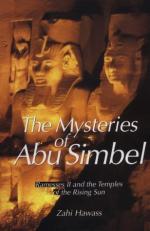|
This section contains 1,349 words (approx. 5 pages at 300 words per page) |

|
Overview
The great temples of the pharaoh Ramses II at Abu Simbel had been unknown to the West until 1813, when they were visited by the Swiss explorer Johann Ludwig Burckhardt (1784-1817). In 1817 Giovanni Belzoni (1778-1823) began the process of digging away the sand that had hidden most of the site. Copies of its hieroglyphic inscriptions were used by Jean-Francois Champollion (1790-1832) as he completed deciphering the Egyptian script a few years later. In the 1960s the temples at Abu Simbel were moved to prevent their submersion as a result of the construction of the Aswan High Dam.
Background
The famous temples at Abu Simbel, in the southern Egyptian region of Nubia, were built by the pharaoh Ramses II in about 1260 B.C. to celebrate the thirtieth year of his reign. Building ornate tombs and temples to their own memory was...
|
This section contains 1,349 words (approx. 5 pages at 300 words per page) |

|


